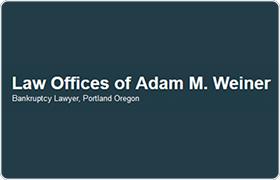Portland Bankruptcy Lawyer, Oregon
Sponsored Law Firm
-
 x
x

Click For More Info:
-
Law Offices of Adam M. Weiner
8624 SE 13th Ave Portland, OR 97202» view mapBankruptcy & Debt Premier Bankruptcy Attorney
Life doesn’t always have to be hard. Consult with a bankruptcy attorney who looks out for your best interests. Call today to begin the process for a fresh financial start.
503-719-5123
Includes: Bankruptcy Litigation, Commercial Bankruptcy, Consumer Bankruptcy, Dissolution
Collin C. McKean
✓ VERIFIEDEstate Planning, Bankruptcy, Personal Injury, Family Law, Federal Appellate Practice
We make solutions for our clients, helping them navigate difficult transitions.
FREE CONSULTATION
CONTACTFREE CONSULTATION
CONTACTMatthew A. Casper
Litigation, Consumer Protection, Dissolution, Commercial Bankruptcy
Status: In Good Standing
FREE CONSULTATION
CONTACTFREE CONSULTATION
CONTACTTanith Leigh Balaban
Internet, Litigation, Commercial Bankruptcy
Status: In Good Standing Licensed: 16 Years
Sara A. H. Sayles
Land Use & Zoning, Commercial Real Estate, Permits, Bankruptcy
Status: In Good Standing Licensed: 16 Years
Tara J Schleicher
Lawsuit & Dispute, Estate, Bankruptcy, Bankruptcy & Debt
Status: In Good Standing Licensed: 29 Years
 Adam M. Weiner Portland, OR
Adam M. Weiner Portland, OR Practice AreasExpertise
Practice AreasExpertise

